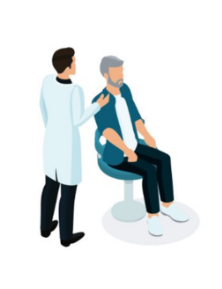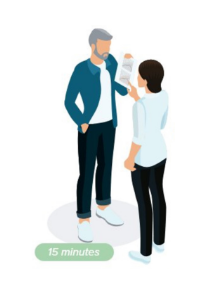
Living with hearing loss
It can be really frustrating when your companions have a fantastic time while you are isolated due to your hearing loss. However, it does not end up this way. Hearing loss is one of the most common health conditions among adults, and most types can be treated.
The most important step
Our sense of hearing holds immense importance, yet numerous individuals experiencing its decline often deny the inevitable reality for an extended period of time. Hence, the most important step is to acknowledge the fact that you have hearing lossHearing Loss. Otherwise, you cannot proceed with treatment.
The first step can be the most difficult, and it may take some time before you feel ready to take it. But every journey begins with the first step. Once we've identified the cause, there are numerous options for minimizing the effects.

Effects of Untreated Hearing Loss
Although everyone’s experience with hearing loss is unique, numerous studies have connected untreated hearing loss to a variety of significant emotional and social consequences.
- Irritation, negativity, and anger.
- Tiredness, worry, stress, and depression.
- Avoiding or withdrawing from social situations
- Difficulties in communicating with other people
- Social rejection and loneliness.
- Reduced awareness and increased risk to personal safety
- Weakened memory and decreased ability to learn new skills
- Reduced performance at work or in education
What to expect at your hearing test
You might be wondering what takes place at a audiometry test, such as what types of tests you’ll take and what you can expect to learn. We have three types of tests in our clinics, these are; An AMTAS - computer test using specific hearing software (15 mins), a Screening test with a Clinician (30 mins) and a full test with a Clinician (60 mins).
Our brief guide below will provide you with a step by step guide of the full test.
Congratulations
Your test is booked and you're on the path to better hearing!

Discuss hearing concerns, medical history, and lifestyle factors

Physical ear examination
Your clinician will conduct a visual exam of your ears to check for any earwax blockages or other irregularities.

Comprehensive hearing assessment
Which includes a series of tests - such as tone. speech and a test of your eardrums.

Same-day test results and recommended solutions
Option1 - No hearing loss
Receive healthy hearing advice
Option2 - Hearing loss detected
Receive advice on hearing aid solutions
Do you feel like this?
Take a moment to see if you recognise some of these 10 statements:

- I feel that my family and friends are tired of repeating everything to me.
- I often find people around me mumbling and speaking softly.
- I have to turn up the volume on my TV, radio, and phone.
- I can’t hear what people are saying if they don’t look directly at me.
- I often need to rest after work or school because I am so tired.
- I am often uncertain when I am out because I don’t know where sounds are coming from.
- I have problems recognising speech, especially in gatherings with other people.
- I often feel depressed and alone.
- I think it’s very difficult to have a conversation in a crowded place.
- I often have problems remembering. If some of these symptoms and worries are familiar to you, it is important to seek help. They can all be related to hearing loss.


